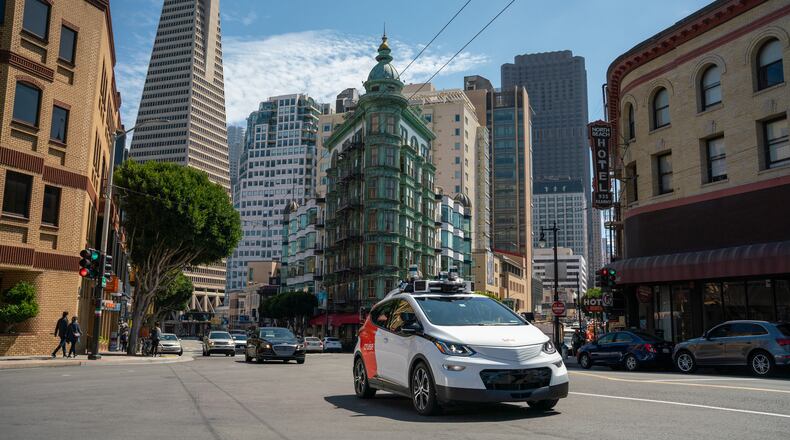For the moment, there’s still a driver at the wheel, but San Francisco-based Cruise has begun testing its self-driving vehicles in Atlanta.
While Cruise intends to eventually operate a ride-hailing service with autonomous vehicles here, a company spokeswoman said a driver would be behind the wheel in the initial phase as its cars roll through parts of downtown, Midtown and Buckhead.
“It’s an important first step in getting to know Atlanta’s roads (and) driving behaviors before we progress to driverless operations,” said Anna Haase, in an email statement on Tuesday.
The company had announced its intentions in Atlanta in an online post on X, the site formerly known as Twitter, on Monday.
Cruise, which has raised $10 billion from investors including General Motors, Honda, Microsoft, T. Rowe Price and Walmart, has a fleet of nearly 400 all-electric vehicles.
The company is now operating a driverless taxi service in San Francisco, Austin and Phoenix.
Cruise officials say their vehicles have logged more than 3 million driverless miles and completed tens of thousands of rides. Among the accomplishments have been 35,000 driverless deliveries in Phoenix, according to the company.
Cruise is a relatively recent upstart in the effort to build a self-driving vehicle sector.
Safety is a crucial reason to develop the autonomous technology, the company said, since nearly all of the 40,000 people who die each year in car crashes are killed because of human error.
“Cruise is singularly focused on its mission to improve road safety, reduce emissions, and reduce congestion with its all-electric, driverless, ride-hail service in cities, which is where we’ll see the most significant positive impact the soonest,” the company said.
But safety is also a concern in the rush to take American hands off the steering wheel.
Much of the publicity generated by self-driving vehicles thus far has been generated by Tesla — the first and loudest in rolling out its technology, but also responsible for most of the negative news.
Tesla’s autopilot technology alone was involved in 736 crashes since 2019, including 17 fatalities, according to an analysis by the Washington Post of data collected by the National Highway Traffic Safety Administration.
“The vast majority of the 807 automation-related crashes have involved Teslas, the data shows,” the Post reported. “Tesla — which has experimented more aggressively with automation than other automakers have — also is linked to almost all of the deaths.”
Cruise announced a week ago that it was expanding its testing to Nashville and has begun testing in Los Angeles.
Atlanta is already seeing testing of autonomous vehicles.
Earlier this year, the Cumberland Community Improvement District officials launched an autonomous vehicle in partnership with Beep, an autonomous transport company.
About the Author
The Latest
Featured



